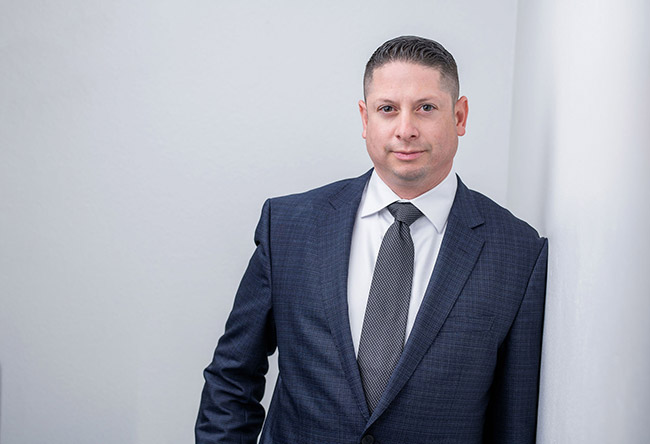Drug Crime Attorney
in Riverside, California
Drug Crime Defense Lawyers in Riverside, California
At Fontes Law Group, we understand the severity of drug-related offenses in Riverside and the aggressive approach taken by the Riverside District Attorney’s Office, which even has a specialized unit dedicated to prosecuting these types of crimes. That’s why we offer experienced and skilled criminal defense for those facing drug charges.
Our team is dedicated to achieving the best possible outcome for our clients. We will not only defend your Constitutional rights but also thoroughly investigate the facts of your case and, if necessary, take your case to trial.
We have a proven track record of successfully reducing charges from more serious felonies to less severe misdemeanors through effective negotiation, which can result in avoiding jail time, a felony conviction, and the additional penalties that come with it.
If you or someone you know is facing drug crime charges in Riverside, don’t hesitate to contact Fontes Law Group for a consultation and to discuss your legal options. Trust our experienced team to defend and protect your rights.
California Drug Laws
Navigating the intricate drug laws in California can be a challenging task. It’s essential to work with a skilled and experienced Riverside criminal defense attorney who has a thorough understanding of these laws.
The following are some examples of the types of activities that may result in drug-related criminal charges:
-
- Operating under the influence of illegal drugs
- Possession of equipment or tools used for taking drugs (such as pipes or needles)
- Having illegal drugs on one’s person for personal consumption
- Having illegal drugs for the purpose of selling or distribution
- Making or growing illegal drugs
- Smuggling or illegally transporting illegal drugs
- Selling illegal drugs
- Giving illegal drugs to others with the intent for them to sell
- Transporting illegal drugs in a vehicle
- Attempting to sell, manufacture or smuggle illegal drugs.
What are controlled substances?
Controlled substances, as defined by California Health and Safety Code, include a wide range of illegal drugs such as marijuana, methamphetamine, cocaine, LSD, peyote, PCP, ecstasy, and heroin, as well as certain prescription drugs that are not legally obtained through a prescription. Examples include Hydrocodone, Vicodin, Oxycontin, Ritalin, Codeine, Morphine, Adderall, Alprazolam (Xanex), Diazepam (Valium), Lorazepam (Ativan), and Buprenorphine (Suboxone).
The Riverside District Attorney’s Office has discretion in how they charge drug-related crimes and take several factors into consideration, such as the type and amount of the substance, whether it was intended for personal use or sales, the presence of minors, and the individual’s criminal history. It is important to have an experienced Riverside drug crime attorney who is familiar with these complex laws to help defend your case.
Drug crimes in California can be charged as either felonies or misdemeanors, with the potential punishment for a misdemeanor being less severe than that for a felony. At Fontes Law Group, we have a history of successfully reducing felony drug charges to misdemeanors for our clients, which can result in avoiding harsh penalties.
We also achieved Deferred Entry of Judgement for many clients which enabled them to eventually have the conviction expunged from their records. This is why we believe it is vital to have a Riverside drug crime attorney who is knowledgeable and skilled in this area of law to achieve the best possible outcome for your case.

Meet Criminal Defence Lawyer
Victor Franco
Drug Possession for Personal Use
California law prohibits the possession of certain illegal substances, such as methamphetamine, cocaine, opium, heroin, PCP, LSD, hashish, and marijuana in certain amounts. This is outlined in California Health and Safety Code sections 11377, 11350, 11357(b), 11357(c), and 11359.
Under California law, marijuana possession can be charged as either a misdemeanor or an infraction. California Proposition 47, passed by voters in 2014, reduced the penalties for marijuana possession to misdemeanors and infractions only. Possession of less than an ounce of marijuana is considered an infraction, while possession of more than an ounce is considered a misdemeanor. These charges and penalties can be more severe if the marijuana possession occurred on school grounds.
The state of California offers alternative sentencing options for first or second-time drug crime offenders, such as Prop 36 and drug diversion programs. These alternatives allow individuals to avoid jail time, serve a short probation period, attend a drug rehabilitation program, and upon completion of the program, have the arrest and conviction expunged from their records.
Possession of drugs for sale is also illegal in California. The Riverside District Attorney’s Office has discretion to charge individuals with possession of drugs for personal use or possession of drugs for sales, which carries much harsher penalties. California Health and Safety Code sections 11351, 11378 and 11351.5 make it a felony to possess drugs with the intent to sell them.
Factors that law enforcement and District Attorneys use to determine drug sales include:
- Possession of a significant amount of illegal drugs
- Use of equipment for measuring drugs
- Possession of multiple phones
- Evidence of drug-related transactions in text messages
- Specific methods of packaging drugs
- Large sums of money
- Breakdown of money denominations
- Presence of advanced security measures
- In many cases, drug possession for personal use is incorrectly charged as possession for sales, which can result in harsher penalties.
At Fontes Law Group, we have a track record of achieving reduced charges for clients initially charged with possession of drugs for sale and defending them in the court of law.
Transportation and Furnishing of Drugs
Transportation of drugs, including importation and giving away drugs to another person, is illegal under California law. These drug crimes, often charged as felonies, carry harsher penalties than possession charges.
Transportation charges are typically filed under California Health and Safety Code Sections 11379 or 11352. The maximum punishment for these charges is up to five years in state prison if charged under Section 11352 and up to four years in state prison if charged under Section 11379.
However, there are various defenses that an experienced drug crime defense attorney can identify to achieve the best possible outcome for your case. Fontes Law Group has a history of negotiating reduced charges for clients initially charged with transportation.
Manufacturing Drugs
Under California law, manufacturing of controlled substances includes activities such as compounds, converts, produces, derives, processes, or prepares, either directly or indirectly by chemical extraction or independently by means of chemical synthesis. A person can also be convicted of this crime by offering to manufacture the controlled substance.
This crime is punishable by up to seven years in state prison and can be increased by an additional two years if the place of manufacturing was a structure where a child under the age of 16 was present.
Being Under the Influence of Illegal Drugs
Under California Health and Safety Code Section 11550, it is illegal to use or be under the influence of certain controlled substances. This crime is typically charged as a misdemeanor, but repeat offenders may face felony charges. Additionally, if a person is found in possession of a loaded, operable firearm while under the influence of a controlled substance, they may be charged with a felony.
The penalties for a misdemeanor conviction under Health and Safety Code Section 11550 can include:
- A minimum sentence of 90 days in county jail
- Registration as a drug offender
- Standard court costs and fines
- A probationary period
However, many individuals charged with Health and Safety Code Section 11550 are eligible for alternative sentencing options, such as Proposition 36 or Deferred Entry of Judgment (DEJ) programs, which can reduce penalties and avoid jail time.
Reasonable, Flat-Fees With Payment Plans Available
We quote reasonable fees for our criminal law matters. They are accepted on a flat-fee basis, and payment plans are available. Our sophisticated, efficient, affordable, and client-centered services separate us from other firms as we help our clients achieve their goals.

